Travel has always been an integral part of my relationship with my husband, so when I discovered I was pregnant at the same time that he was accepted to graduate school in Spain, I was determined not to let it change things. What I didn’t fully appreciate were the challenges – and rewards – that would come with this decision.
Continuing to travel throughout pregnancy and the infancy and toddlerhood of our child hasn’t been easy.
When flying, we’ve gone from the black diamond lane to the dreaded family lane. Destinations have to be planned and arrangements made in advance rather than on the fly. And anywhere we go, we’re subject to the whims and needs of a tiny person who may or may not feel like going to the Louvre today. So why even go through all the trouble?
Taking your child traveling benefits him in many of the same ways travel benefits you, and forces you to grow as a traveler.
Here are my top 10 reasons for raising an Indie Traveler, based on the Indie Travel Manifesto:
1. Seeing yourself in the context of a rich and complex world
What better way to learn that the world is a big place than to start exploring it while young? Take your child traveling and his or her worldview will never be confined to your neighborhood, city, state, and so forth. This, and variations on this, was frequently the first response when I surveyed fellow travelers on the benefits of traveling with your child.
It’s one thing to say to your child that they should eat their dinner, because people across the world are starving. It’s another for your child to see poverty and struggling firsthand. Disclaimer: This is by no means a guarantee that your finicky toddler will finish his peas.
Part of learning about other cultures and the place your world has in them is learning that every way of life has pros and cons.
Travel makes you both appreciate where you came from and learn ways that it could be improved. Children who travel learn that not everyone has the same opinions and ideas about everything, and that that’s okay.
2. Options over possessions
When I look at the piles of stuff other children in the U.S. have, I’m always amazed. By necessity, we’ve kept our possessions and our son’s to a minimum. We haven’t lived in the same place for longer than six months since my son was born, and we would be miserable if we had to tote around a room full of baby stuff, let alone multiple strollers, cribs, car seats, diaper bags, toys, baby computers, DVDs, music players, games, stuffed animals, and so on.
At the end of the day, my kid’s just as engaged and busy playing with a roll of masking tape and a couple of empty plastic containers than most fancy new toys.
Kids learn so quickly and get bored so easily with the same repetitive toys – showing them ways to create or play with what you have on hand teaches them to become engaged, creative, and interested in the world around them. That being said, having a few favorite toys, such as blankets or sleep soothers, can help ease the transition from place to place when you do a lot of traveling.
3. Interactions over transactions
Having an active toddler who isn’t shy about interacting with strangers means I get lots of interaction with locals. After three months in Spain, my son started responding “Hola!” when people wave at him.
Of course, this includes plenty of apologizing when he invites himself to someone’s al fresco lunch at a café or decides to spend the first half of a flight screaming in protest. But it also means I get plenty of insider tips while hanging out with other parents at playgrounds. And there’s something sweet about watching people grin and talk to him while we’re out and about. People that I would normally never get a chance to speak to are friendly and welcoming, and many stop to chat with us.
4. Adapt as you go rather than micromanage in advance
Taking your child with you rather than leaving them home forces them to learn how to adapt. Although things may be easier at home, with familiar spaces and routines, letting them experience new surroundings with you teaches them that new and different is not necessarily something to be afraid of.
And even though it might be intimidating at first, like anything else in life worth doing, traveling with your child gets easier with practice.
Think back to the first time you planned a trip for yourself – I bet it was a bit of a scary experience. But now, you can pack and plan in your sleep! So don’t despair, traveling with your child will soon be just as automatic as traveling by yourself.
5. Slow down and enjoy an experience

Having a child forces you to slow your pace of travel. My travel itinerary before a baby may have been: late waking, lazy breakfast, museum, nap, dinner, drinks. Now, I’m forced to spend more time in grocery stores, parks, and playgrounds.
Rather than bustle from attraction to attraction, I find myself discovering interesting details all over the city.
I’ve stumbled across work by Antoni Gaudi everywhere in Barcelona while out walking with my son, not just in the few places frequented by tourists. And when visiting museums, I discover interesting features in the courtyards while letting my son have some playtime. Most museums are housed in beautiful, architecturally interesting buildings, and such details I would usually miss when focused on the works in the galleries.
6. Seek pleasure in simple moments and details
My last pre-child trip was an extravagant Japan excursion. My husband and I spent lavishly and hit all the “must see” activities: cherry blossoms, Kyoto temples, fancy kaiseki dinners.
Yet none of these makes the list of my top travel experiences. What does?
Biking through the Mallorca countryside with my son in the seat behind me. Walking through a park in Paris in the spring carrying him while he points at flowers. Letting him crawl on the floor of a remote cabin in New Hampshire while the morning sun streams through the windows. Watching him fall over in the sand on the Barcelona beach a month after learning to walk.
7. Learn the economic, political, and environmental context of my host culture
I remember being a teenager in history class. The first question to the teacher after the lecture was always, “Will this be on the test?” History, to me, was little more than memorization of facts, dates, and related events. Contrast this with, a few years later, being led on a tour around Budapest by a girl close to my age, who described being tear gassed during a protest earlier that month. Seeing the effects of history, first hand, brought it home the way no book could.
While my son is still too young to appreciate the history of the places we visit, my hope is that continuing to travel with him throughout his childhood will teach him the impact of history and culture.
There’s no way to shield him from the atrocities of war if we visit Auschwitz or other similar memorials. Though these conversations may be difficult, they are still important, especially as your child grows and develops his sense of morality and self.
8. Practice courtesy, patience, humility – and good humor

I’ve grown as a traveler because I had a child. I’m so grateful to fellow airline passengers who are patient with me when I try to calm a screaming baby, because I was never patient. I appreciate fellow travelers who pause and aren’t exasperated when my toddler runs in front of them unexpectedly.
My child has forced me to be more humble and to understand the worldview of others in a way I never did despite all my travel before I had him.
I was definitely a savvy and experienced traveler, but now I’m a more patient, kind, and thoughtful traveler. All important qualities to have when experiencing a new culture!
9. Seek to understand – not judge or romanticize – other cultures
Picture this:
Your kid is sitting down to a typical elementary school lunch. One of the kids starts talking: “My mom told me they eat SQUID in China! Ewwwww!” Instead of joining into the culture-bashing, your child calmly replies, “Yeah, and it’s pretty good, too. Tastes like chicken!”
As unlikely as this scenario may seem, we’d all benefit from a little less judgment and a lot more experience. What better place to start than at home? The more you travel, the less scary travel becomes, and the less scary other cultures become. And that’s a good thing.
10. Share what you’ve learned with others
One of the most difficult things to deal with when we decided to move to Europe was the incessant, probing questioning that followed our decision. The idea that we would give up a settled, stable home in the U.S. to move to a foreign country while pregnant seemed totally outlandish to most people. Although the experience has been by no means perfect or easy, I’d like to think that by doing it, we’ve shown others that it’s not nearly as daunting as it may seem.
Technology has made globalization a way of life for most of the world. With Google at our fingertips, there’s no excuse anymore for why you can’t travel, and more and more companies are crossing international boundaries.
By bringing our child into contact with other cultures, both at home and abroad, we hope to show him that even though the world is a huge place, there are still things that people all over the world have in common. We also hope to teach him that differences in opinion and lifestyle are interesting rather than bad.
As an indie traveler, you’re a cultural ambassador, bringing your culture to those abroad and bringing culture from abroad home. So why not start that process as early as possible?
To read more about indie travel and traveling with children, check out the following articles:
- Introducing the Indie Travel Manifesto
- Why New Zealand is a Great Destination for Indie Travel
- Make Meaningful Connections (and More Indie Travel Values We Love)
- 21 Reasons to Travel Around the World with Kids…From Those Who Have Done It
- Why It’s Not Selfish for Parents to Travel With Young Children
- 6 Ways that Traveling with Kids Can Actually Improve Your Travel Experience
- Why You Should Ignore All the Urban Legends & Take The Kids to Mexico
Photo credits: jyri, all others courtesy of the author and may not be used without permission.







